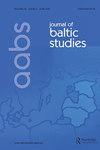Mnemonic过境点:波罗的海边境的罗姆人社区如何记住他们共同的过去
IF 0.5
4区 社会学
Q2 AREA STUDIES
引用次数: 0
摘要
摘要:被国家边界隔开的罗姆人社区是如何纪念和纪念纳粹种族灭绝的?他们是如何在不断变化的边界上为自己的损失进行沟通和哀悼的?本文利用我在立陶宛-白俄罗斯和白俄罗斯-拉脱维亚边境地区的口述历史和民族志研究,探讨了社区记忆与边界之间的复杂关系。从纳粹种族灭绝之前、期间和之后罗姆人的家族史出发,我的分析采取了几个分析方向:1)将记忆路径与罗姆人社区的轨迹联系起来;2) 强调不断变化的边境制度对罗姆人纪念活动的影响;3) 揭示了跨国界记忆的交际方面。我的分析使我能够勾勒出一个跨国界记忆社区的现象。这些社区基于罗姆人的家庭和社区网络、他们共同的历史以及对过去的态度,例如对苏联时代的怀念。文章的最后一节展示了苏联的怀旧情绪如何与对纳粹种族灭绝的纪念交织在一起。本文章由计算机程序翻译,如有差异,请以英文原文为准。
Mnemonic border-crossings: how Roma communities from the Baltic borderlands remember their shared past
ABSTRACT How have Roma communities, separated by state boundaries, remembered and commemorated the Nazi genocide? How have they communicated and mourned for their losses across shifting borders? This article explores the complex relationship between community memory and borders, drawing on my oral history and ethnographic research in the Lithuanian – Belarusian and Belarusian – Latvian border regions. Departing from family histories of Roma before, during, and after the Nazi genocide, my analysis takes several analytical directions by: 1) linking the memory paths with the trajectories of Roma communities; 2) highlighting the ways in which changing border regimes have shaped a Romani commemoration practice; 3) revealing communicative aspects of cross-border memories. My analysis enables me to outline a phenomenon of a cross-border memory community. Such communities are based on family and community networks of Roma, their shared histories, and attitudes toward the past, for instance, nostalgia for the Soviet time. The last section of the article demonstrates how the Soviet nostalgia interweaves with the commemoration of the Nazi genocide.
求助全文
通过发布文献求助,成功后即可免费获取论文全文。
去求助
来源期刊

Journal of Baltic Studies
AREA STUDIES-
CiteScore
1.20
自引率
0.00%
发文量
52
期刊介绍:
The Journal of Baltic Studies, the official journal of the Association for the Advancement of Baltic Studies (AABS), is a peer-reviewed, multidisciplinary journal for the purpose of advancing the accumulation of knowledge about all aspects of the Baltic Sea region"s political, social, economic, and cultural life, past and present. Preference is given to original contributions that are of general scholarly interest. The Association for the Advancement of Baltic Studies is an international, educational, and scholarly non-profit organization. Established in 1968, the purpose of the Association is the promotion of research and education in Baltic Studies.
 求助内容:
求助内容: 应助结果提醒方式:
应助结果提醒方式:


